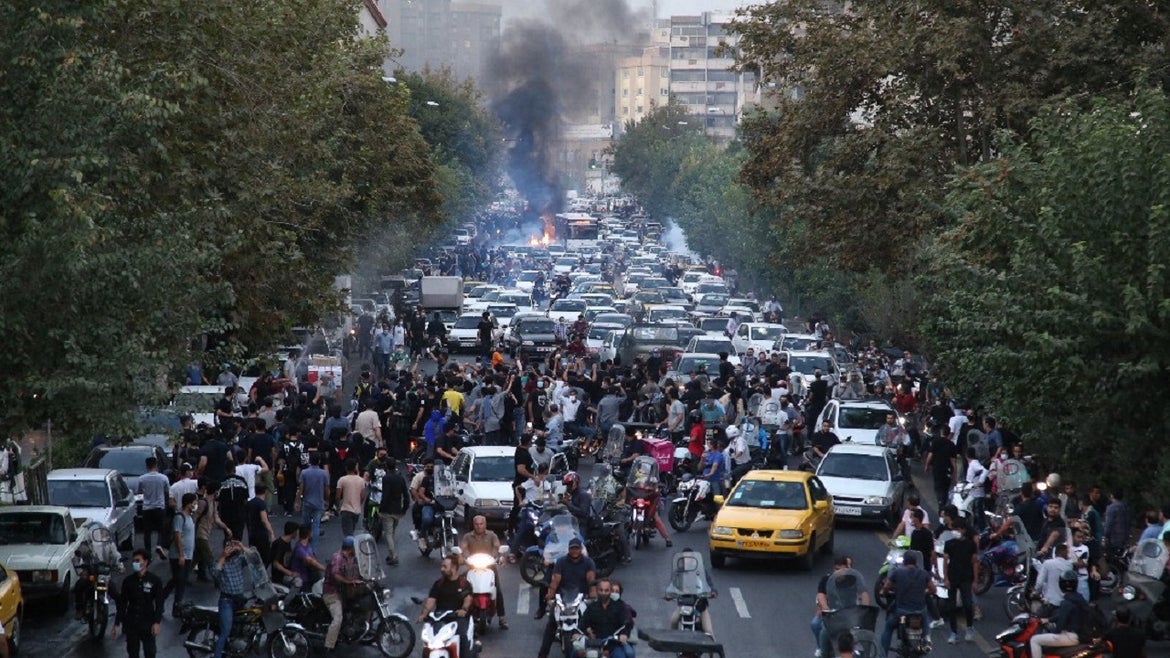Iran's repressive cleric regime is pushing back against widespread protests since the death of Mahsa Amini, who was arrested by the morality police.
Iran has begun issuing death sentences over growing, nationwide protests as the oppressive regime struggles to restore order after nearly two months of street demonstrations.
Human rights groups warned the executions could be followed by many more.
Revolutionary Courts in Tehran declared one defendant had hit and killed a policeman with his vehicle, judiciary's Mizan news agency said. A second had stabbed a security officer, according to the agency, and three others were found guilty of offenses including blocking traffic and setting fire to a government building.
None of the defendants were named.
The Tehran court said the alleged fire-starter was guilty of "enmity against God," the state news agency reported this week. The demonstrator also was convicted of "disturbing public order and peace, community, and colluding to commit a crime against national security, war and corruption on Earth, war through arson, and intentional destruction," according to IRNA, the government-controlled news outlet.
Some 20 people currently face charges punishable by death, according to Norway-based Iran Human Rights. Director Mahmood Amiry-Moghaddam urged countries to urgently act and "strongly warn the Islamic Republic of the consequences of executing protesters."
He condemned the execution orders. "Protesters don't have access to lawyers in the interrogation phase, they are subjected to physical and mental torture to give false confessions, and sentenced based on the confessions," Amiry-Moghaddam told Agence France-Presse.
Protesters, many of them women, have openly rebelled against the hardline government since Mahsa Amini died in custody after being arrested by morality police. The 22-year-old woman was accused of not properly wearing a hijab, the mandatory head covering for Iranian females past the age of 9.
An estimated 300 people have died during protests that erupted after Amini died in September. Thousands have been arrested. Social media ignited this week over false reports that 15,000 Iranian protesters were slated for execution.
The incorrect claims were reposted by celebrities, Canadian Prime Minister Justin Trudeau, and news agencies. Many were later taken down after word spread they were inaccurate.
Instead, the number reflects more than 15,000 arrests that have been made since demonstrators spilled onto highways, squares and outside state offices to demand the removal of restrictive measures such as the hijab order, according to international human rights groups.
More than 350 have died in violent government crackdowns on protesters, the organizations have estimated.
Shops in Tehran's historic Grand Bazaar and other retail outlets across the country closed their doors Tuesday and two soccer stars announced they would not be attending the upcoming World Cup in Qatar, where Iran will compete.
The U.S. Navy said Tuesday it seized 70 tons of missile fuel components hidden in fertilizer bags on an Iranian ship headed for Yemen, where Iranian-backed rebels have been targeting the government.
Iran also has targeted Saudi Arabia, the U.S., and other countries it accuses of fueling protests to overthrow the Islamic Republic's theocracy.
Social media posts from Iran have shown government forces opening fire on demonstrators. On Tuesday, footage surfaced showing subway passengers panicking as shots rang out.
In city after city, women have been seen burning their government-ordered head scarves and dancing around bonfires. Students have boycotted schools and colleges in protests against the regime that has ruled for more than 40 years.
Blocking cars and taking over thoroughfares, demonstrators have screamed "death to the dictator" as drivers honked their horns in solidarity.
"Iranian girls and women are protesting discriminatory rules and calling for wholesale change to achieve their fundamental rights and freedoms. The Iranian authorities, and the world, should listen," said an essay published Wednesday by Human Rights Watch.
Related Stories






